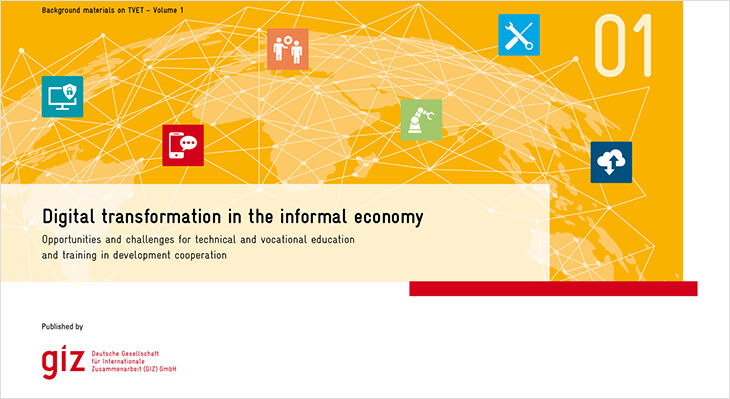What does the digital future of work mean for development cooperation?
The "future of work" in the informal economy presents opportunities and challenges in development cooperation. How are work and employment in developing countries changing with the digital transformation? The current publication "The digital transformation in the informal economy" by GIZ provides answers.

Which type of employment in which sectors requires which skills? How must vocational training systems be designed to meet these changing requirements and their continuous transformation? How can vocational education and training measures be planned and implemented to prepare for work in the age of digital transformation and to take advantage of the opportunities it offers? The GIZ sector project "Vocational Education and Training" addresses these questions and provides recommendations for action in the first volume of its new publication series "Background materials on TVET" (English and German).
The digital transformation of the world of work in emerging economies and developing countries inevitably has an impact on employment in the informal economy. The form and extent of these effects must be observed in each country context. Correspondingly, research on the consequences of digitalisation for the informal economy focuses on the effectiveness of TVET approaches and measures - with many blind spots still remaining. This makes it all the more important for current practical examples to provide important impulses for projects and implementation in development cooperation for the benefit of those working in the informal economy.
The Sector Project "Technical and vocational education and training (TVET)" supports the Federal Ministry for Economic Cooperation and Development (BMZ) in further developing strategies and approaches to vocational training for German and international development policy.
Background
According to the ILO, the term "informal economy" encompasses "all economic activities of employees and economic entities that are not - by law or in practice - covered or not sufficiently covered by formal regulations". According to GIZ, almost 70 percent of all employees in emerging economies and developing countries work in the informal economy – in sub-Saharan Africa and South Asia almost 90 percent. The informal economy secures employment and income where there are not enough formal jobs. It also enables young people to enter the labour market. At the same time, this informal labour market increases the risk of poverty through poorer wages and lack of social security, further more working conditions often do not meet the requirements for decent work.